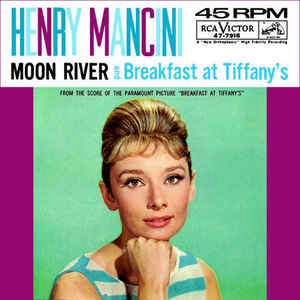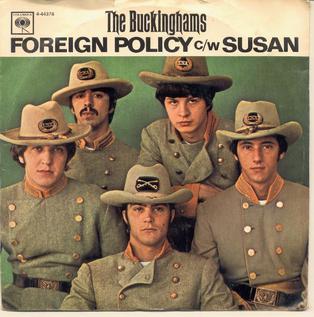Related Research Articles

"Moon River" is a song composed by Henry Mancini with lyrics by Johnny Mercer. It was originally performed by Audrey Hepburn in the 1961 movie Breakfast at Tiffany's, winning an Academy Award for Best Original Song. The song also won the 1962 Grammy Awards for Record of the Year and Song of the Year.
"It's Almost Tomorrow" is a 1955 popular song with music by Gene Adkinson and lyrics by Wade Buff. The song was actually written in 1953, when Adkinson and Buff were in high school. Hit versions were released in 1955 by The Dream Weavers, Jo Stafford, David Carroll, and Snooky Lanson.

"Hold Me, Thrill Me, Kiss Me" is a song written by Harry Noble and originally performed by Karen Chandler in 1952. It has been re-recorded several times since then, the most notable covers being by Mel Carter in 1965 and Gloria Estefan in 1994.

"Runaway" is a number-one Billboard Hot 100 song made famous by Del Shannon in 1961. It was written by Shannon and keyboardist Max Crook, and became a major international hit. It was No. 472 on the 2010 version of Rolling Stone's list of the 500 Greatest Songs of All Time.

"Red Roses for a Blue Lady" is a 1948 popular song by Sid Tepper and Roy C. Bennett. It has been recorded by a number of performers. Actor-singer John Laurenz (1909–1958) was the first to record the song for Mercury Records. It rose to #2 on the weekly “Your Hit Parade” radio survey in the spring of 1949. The original 78rpm single was issued on Mercury 5201 - Red Roses For A Blue Lady by John Laurenz.

"Take Good Care of My Baby" is a song written by Carole King and Gerry Goffin. The song was made famous by Bobby Vee, when it was released in 1961.

"Breaking Up Is Hard to Do" is a song recorded by Neil Sedaka, co-written by Sedaka and Howard Greenfield. Sedaka recorded this song twice, in 1962 and 1975, in two significantly different arrangements, and it is considered to be his signature song. Between 1970 and 1975, it was a top-40 hit three separate times for three separate artists: Lenny Welch, The Partridge Family and Sedaka's second version.

"Just One Look" is a song co-written by American R&B singers Doris Troy and Gregory Carroll. The recording by Doris Troy was a hit in 1963. The Hollies, Anne Murray and Linda Ronstadt each achieved great success with the song. There have also been many other versions.

"Roses Are Red " is a popular song composed by Al Byron and Paul Evans. It was recorded by Bobby Vinton, backed by Robert Mersey and his Orchestra, in New York City in February 1962, and released in April 1962, and the song was his first hit.

"Easier Said Than Done" is a popular song sung by The Essex that was a number-one song in the United States during 1963. It topped the Billboard Hot 100 singles chart on July 6, 1963, and remained there for two weeks. The song was written by William Linton and Larry Huff.
"There! I've Said It Again" is a popular song written by Redd Evans and David Mann, and popularized originally by Vaughn Monroe in 1945, and then again in late 1963 and early 1964 by Bobby Vinton. The song charted at No. 1 on January 4, 1964 for four weeks.

"Only Love Can Break a Heart" is a popular song from 1962, performed by the American singer-songwriter Gene Pitney. The song was written by Hal David (words) and Burt Bacharach (music) and appears on Pitney's second album Only Love Can Break a Heart.

"My Melody of Love" is the title of a popular song from 1974 by the American singer Bobby Vinton. Vinton adapted his song from a German schlager song „Herzen Haben Keine Fenster“ composed by Henry Mayer, and it appears on Vinton's album Melodies of Love. The song was also recorded by Spanish pop singer Karina as «Palabras de Cristal».
"Last Date" is a 1960 instrumental written and performed by Floyd Cramer. It exemplifies the "slip note" style of piano playing that Cramer made popular. It peaked at number 11 on the country chart and at number two on the Hot 100 behind "Are You Lonesome Tonight?" by Elvis Presley. Cramer's recording inspired a number of successful cover versions, including a vocal adaptation by Conway Twitty.
"Pretty Little Angel Eyes" is a 1961 song by American singer Curtis Lee. It was released on Dunes Records, #45-2007. Phil Spector served as producer, and also produced Lee's follow-up hit "Under the Moon of Love".
"Pretty Blue Eyes" is a song written by Teddy Randazzo and Bobby Weinstein. In 1959, it was a hit single for Steve Lawrence, and in 1960 for Craig Douglas.

"Susan" is a song by The Buckinghams, which they released as a single in 1967, and on their album Portraits in 1968. The song spent 12 weeks on the Billboard Hot 100 chart, peaking at No. 11, while reaching No. 7 on Canada's RPM 100, No. 2 on Canada's CHUM Hit Parade, No. 2 in the Philippines, and No. 18 on New Zealand's NZ Listener chart.
"Just as Much as Ever" is a song written by Charles Singleton and Larry Coleman. The song was a hit single for Bob Beckham, Nat King Cole, and Bobby Vinton.
"Our Winter Love" is an instrumental composition by Johnny Cowell, which was a hit single for Bill Pursell. Pursell's version was recorded in 1962, and was released as a single in January 1963.
"Leave Me Alone " is a song released in 1958 by Dicky Doo & the Don'ts. The song's melody is based on the Battle Hymn of the Republic. The song spent nine weeks on the Billboard Hot 100, reaching No. 44, while reaching No. 47 on the Cash Box Top 100, and No. 29 on Canada's CHUM Hit Parade.
References
- 1 2 Whitburn, Joel (2008). Joel Whitburn Presents Across the Charts: The 1960s , Hal Leonard Corporation, p. 119. Retrieved January 29, 2018.
- ↑ Lonergan, David F. (2005). Hit Records, 1950-1975 , Scarecrow Press, p. 206. Retrieved January 29, 2018.
- ↑ "Late Single Spotlights", Billboard , December 28, 1963. p. 4. Retrieved January 27, 2018.
- ↑ The Hot 100 - Week of February 22, 1964, Billboard.com. Retrieved January 27, 2018.
- ↑ "Cash Box Top 100", Cash Box , February 15, 1964. p. 4. Retrieved January 27, 2018.
- ↑ "CHUM Hit Parade - Week of February 17, 1964". CHUM. Archived from the original on November 7, 2006. Retrieved 2016-12-27.CS1 maint: bot: original URL status unknown (link) Chart No. 362.
- ↑ "Album Reviews", Billboard , March 21, 1964. p. 56. Retrieved January 27, 2018.
- ↑ "Easy Listening", Billboard , March 7, 1970. p. 52. Retrieved January 27, 2018.
- ↑ Adult Contemporary - Lawrence Welk & His Orchestra Southtown, U.S.A. Chart History, Billboard.com. Retrieved April 23, 2018.